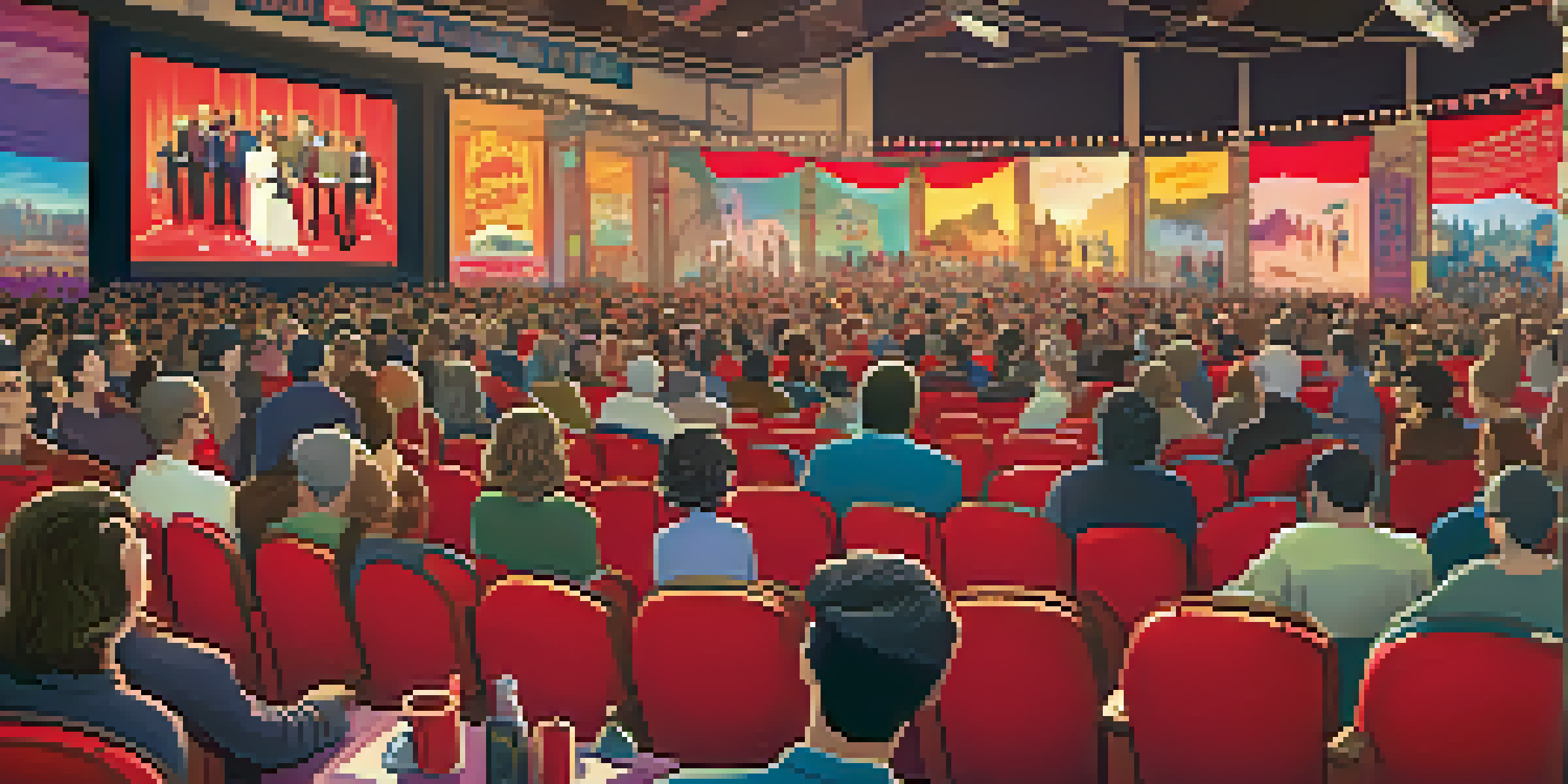Global Cinema: How Films Reflect Political Turmoil Worldwide

The Power of Film in Shaping Political Narratives
Film has always been a potent medium for storytelling, capable of transcending cultural barriers. Through compelling visuals and narratives, filmmakers can spotlight political issues and evoke emotional responses from audiences. This unique ability to reflect societal struggles makes cinema a powerful tool for social change.
Film is a powerful instrument for social change, capable of shaping political narratives and influencing public perception.
For instance, movies like 'The Killing Fields' and 'Hotel Rwanda' not only entertain but also educate viewers about historical atrocities and the consequences of political strife. By depicting real-life events, these films encourage viewers to engage with complex issues, fostering a deeper understanding of the political landscape.
Furthermore, filmmakers often use allegory and metaphor to comment on contemporary politics. By disguising their critiques within fictional narratives, they can safely address sensitive topics, making their messages resonate more profoundly with audiences.
Global Perspectives: Regional Films and Political Contexts
Different regions of the world produce films that reflect their unique political climates. For example, Iranian cinema often portrays the struggles of individuals against oppressive regimes, as seen in films like 'A Separation.' These narratives not only resonate locally but also capture the attention of international audiences, raising awareness about human rights issues.

Similarly, Latin American cinema frequently explores themes of revolution and social justice, as illustrated in films like 'The Motorcycle Diaries.' These stories reflect the tumultuous history of the region while inspiring hope and resilience among viewers. By showcasing local narratives, filmmakers help preserve cultural identity amidst political chaos.
Films as Tools for Political Change
Cinema has the unique power to spotlight political issues and evoke emotional responses, driving social change.
As these films gain global visibility, they spark conversations about political unrest and inspire activism. They serve as reminders that stories of struggle are not confined to borders, encouraging solidarity among marginalized communities worldwide.
Documentary Filmmaking: Capturing Political Realities
Documentaries have emerged as a vital form of cinema that captures the raw essence of political turmoil. Through firsthand accounts and real footage, these films provide an unfiltered look at the realities faced by individuals in conflict zones. This authenticity can evoke a sense of urgency and empathy in audiences, compelling them to take action.
Documentary films are a way for us to look at the world and to understand it better, and they can also be a catalyst for social change.
Films like '13th' and 'Citizenfour' expose systemic injustices and governmental failures, serving as powerful calls to action. By presenting facts and personal stories side by side, documentaries challenge viewers to confront uncomfortable truths about their societies. This blend of information and emotional resonance can spark meaningful dialogue around critical issues.
Moreover, the accessibility of streaming platforms has democratized documentary filmmaking, allowing diverse voices to share their perspectives. This surge in grassroots documentaries enriches the global conversation about political struggles, amplifying stories that might otherwise remain unheard.
Censorship and the Fight for Artistic Freedom
In many countries, filmmakers face censorship for their political content, often risking their safety to tell their stories. Government surveillance and restrictions can stifle creativity and limit the scope of artistic expression. Yet, this oppression often fuels a rebellious spirit among filmmakers who strive to share their messages despite the risks.
For example, in countries like China and Turkey, filmmakers often navigate strict censorship laws while attempting to critique their governments. Films such as 'The Act of Killing' and 'Mustang' illustrate how artists can push boundaries and spark discussions about sensitive topics, even in hostile environments.
Censorship Fuels Filmmaker Resilience
Filmmakers often face censorship, which can stifle creativity but also inspires a rebellious spirit to share important narratives.
This tension between state control and artistic freedom not only shapes the films themselves but also influences global audiences. When viewers learn about the struggles filmmakers endure to share their narratives, it enhances their appreciation for these works and encourages advocacy for artistic freedom.
Audience Reception: How Viewers Engage with Political Cinema
The way audiences receive political films can vary greatly depending on cultural context and personal experiences. Viewers may respond with empathy, anger, or even indifference, shaped by their own political beliefs and backgrounds. This diversity of reactions highlights the complex relationship between film and politics.
For instance, a film like 'Parasite' resonates differently with audiences worldwide, as it examines class disparities through a gripping narrative. While some viewers may see it as a reflection of their own societal struggles, others might interpret it merely as entertainment. This multifaceted reception underscores the power of cinema to provoke thought and discussion.
Moreover, social media plays a significant role in how political films are discussed and shared. Audiences can engage in conversations about the themes and messages portrayed, creating a community of viewers who are passionate about political issues. This collective engagement can amplify the impact of political cinema, turning it into a catalyst for social change.
The Role of Film Festivals in Political Discourse
Film festivals have become essential platforms for showcasing political films and fostering dialogue about pressing issues. Events like the Cannes Film Festival and Sundance Film Festival highlight works that address social and political themes, offering filmmakers the chance to connect with audiences and industry professionals. This exposure can significantly impact the reception and distribution of politically charged films.
Additionally, many festivals host panel discussions and workshops that allow filmmakers to engage with activists, scholars, and audiences. These conversations can deepen understanding of the political contexts behind the films, creating a richer viewing experience. By facilitating such exchanges, festivals contribute to the overall discourse surrounding political turmoil.
Global Dialogues Through Film Festivals
Film festivals serve as crucial platforms for showcasing political cinema and fostering dialogue around pressing social issues.
Moreover, the recognition and awards given at these festivals can elevate lesser-known films, drawing attention to important stories that might otherwise go unnoticed. This spotlight on political cinema encourages filmmakers to continue addressing relevant issues, ensuring that the conversation around political turmoil remains alive and well.
Future Trends: The Evolution of Political Cinema
As we look to the future, the landscape of political cinema is likely to evolve in response to changing global dynamics. Issues like climate change, migration, and social justice are increasingly becoming focal points in storytelling. As filmmakers tackle these pressing concerns, we can expect to see innovative narratives that challenge traditional storytelling methods.
The rise of digital platforms has also transformed how political films are made and consumed. With audiences more connected than ever, filmmakers can leverage social media and streaming services to reach a broader audience, creating a global dialogue around political issues. This accessibility is paving the way for diverse voices that reflect a wide range of experiences and perspectives.

Ultimately, the continued exploration of political themes in cinema serves as a reminder of the importance of storytelling in times of turmoil. As filmmakers harness their craft to confront injustices and engage audiences, political cinema remains a vital force for awareness and change in our world.